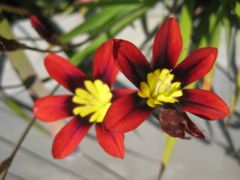Sparaxis tricolor
| Sparaxis tricolor subsp. var. | Velvet flower | |||||||||||||||||||||||||||||||||||||||||||||||||||||||
|---|---|---|---|---|---|---|---|---|---|---|---|---|---|---|---|---|---|---|---|---|---|---|---|---|---|---|---|---|---|---|---|---|---|---|---|---|---|---|---|---|---|---|---|---|---|---|---|---|---|---|---|---|---|---|---|---|

|
|
| ||||||||||||||||||||||||||||||||||||||||||||||||||||||
| ||||||||||||||||||||||||||||||||||||||||||||||||||||||||
Sparaxis tricolor {{{latin_name}}}
|
Wandflower
| ||||||||||||||||||||||||||||||||||||||||
|---|---|---|---|---|---|---|---|---|---|---|---|---|---|---|---|---|---|---|---|---|---|---|---|---|---|---|---|---|---|---|---|---|---|---|---|---|---|---|---|---|---|

|
|
| |||||||||||||||||||||||||||||||||||||||
| |||||||||||||||||||||||||||||||||||||||||
| Standard Cyclopedia of Horticulture |
|---|
|
Sparaxis tricolor, Ker. Fig. 3654. Differs from S. grandiflora only in the color of the fls., which are very variable but always have a bright yellow throat and often a dark blotch at the base of each segm. B.M. 381 (as Ixia tricolor); 1482. F.S. 2:124. F. 1843:213 (as S. picta, S. purpurea, S. pulchella).—According to Baker, this is the favorite species among cultivators. It certainly has the greatest variety of colors and markings. In the works cited the floral segms. range from nearly white through rose, brick-red, carmine, crimson, and light purple to dark purple, excluding blue and yellow, which latter color usually appears in the throat. CH
|
Cultivation
- Do you have cultivation info on this plant? Edit this section!
Propagation
- Do you have propagation info on this plant? Edit this section!
Pests and diseases
- Do you have pest and disease info on this plant? Edit this section!
Species
Gallery
If you have a photo of this plant, please upload it! Plus, there may be other photos available for you to add.
-
photo 1
-
photo 2
-
Sparaxis plants
-
Sparaxis plants
References
- Standard Cyclopedia of Horticulture, by L. H. Bailey, MacMillan Co., 1963
External links
- w:Sparaxis tricolor. Some of the material on this page may be from Wikipedia, under the Creative Commons license.
- Sparaxis tricolor QR Code (Size 50, 100, 200, 500)


